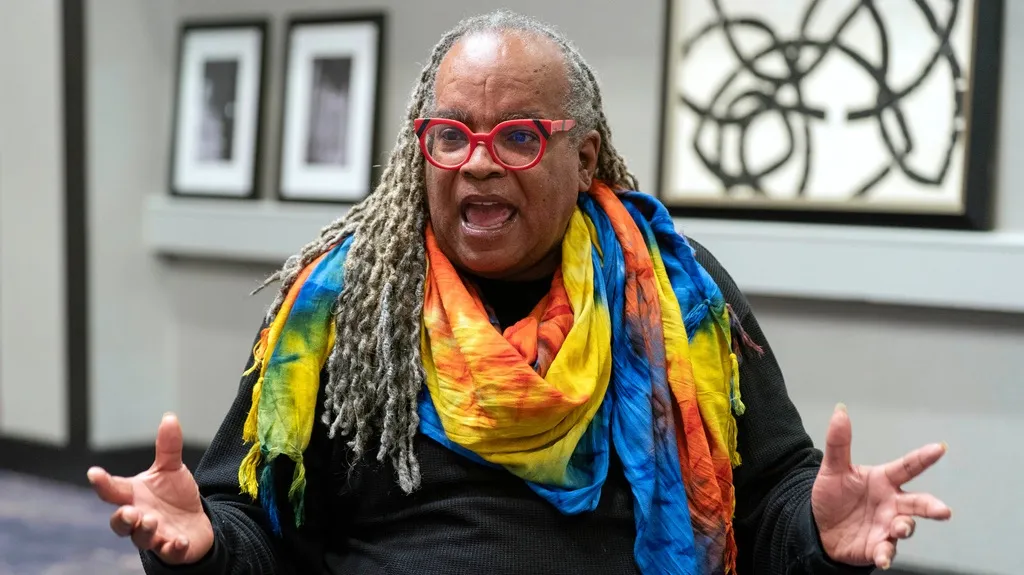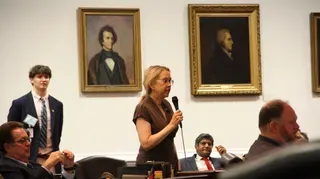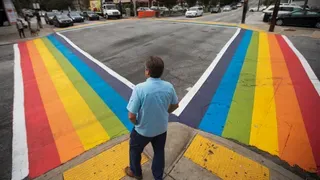August 24, 2009
Panel Takes a 'Raw' Look at Barebacking: Why We Like It, Why We Still Do It
Scott Stiffler READ TIME: 6 MIN.
Lively, sometimes loud debate; passionate viewpoints accentuated by applause from the crowd; and skepticism towards the establishment's ability to effectively advocate for public health. It sounds like a contentious town hall event in which the proposed health care overhaul takes a beating--but it was, in fact, an August 13th public forum sponsored in New York City by the nation's oldest and largest private AIDS service organization, Gay Men's Health Crisis (GMHC).
Certainly, it's understandable why high passion would have erupted at a discussion of the most sensitive topic among gay men today: barebacking. Although its topic was every bit as divisive as Obama's sweeping initiative, the event managed to demonstrate that the town hall format need not devolve into a shouting match.
Actually, it technically wasn't about "barebacking," at least if the organizers could help it. The conclave's premise was that the term "barebacking" unfairly stigmatizes gay men who have unprotected sex.
GMHC's organizers instead chose the no less provocative but apparently more acceptable term "raw" as the title of the event. A poster promoting the night showed a man, shirtless and with back to the camera, displaying the word "RAW" in tattoo form on his back right shoulder.
GMHC Board of Directors Co-Chair Odell Mays moderated a seven-member panel, each of whom had had five minutes to assert his particular point of view around the issue of stigma and unprotected sex. Afterwards, moderator Mays spent the remainder of the evening taking questions and comments from the audience - to which the panel had the option to weigh in on.
� Kenyon Farrow (Interim Executive Director, Queers for Economic Justice), whose work focuses on those in the shelter system, spoke about the complexities of "negotiating sex when you can't have it (in a shelter)." He drew parallels to similar official bans in prison--despite the fact that sex happens in both places, outside of the law and without the benefit of supplied condoms. Farrow also noted that some drugstore chains, such as CVS, lock up condoms in black communities, while they're available on the shelves elsewhere. (CVS and other chains have disavowed the practice, at least publicly.)
� Francisco Roque (Associate Director, Institute for Gay Men's Health, GMHC) invited panelists and the public to think about "how we characterize barebacking" as a stigma bestowed upon one segment of the population. Roque noted that "Brokeback Mountain" was not seen as a tale about "the DL lifestyle." Roque also asked the gay community to honestly assess how such terminology creates "an otherness" which allows us to "stand above our peers."
� Chris Cochrane (Assistant Director, David Geffen Center for HIV Prevention and Health Education at GMHC) spoke of the "common themes I've heard in the last nine years." These included "not being able to stop myself or define limits; getting infected on purpose because there are more benefits if I'm HIV positive; the validation received by anonymous drug-fueled hook-ups" and fucking raw "to feel a sense of belonging."
� Damon Humes (Executive Director of Men of Color Health Awareness Project) talked about the House and Ball communities. He also articulated a problem among men of color who have sex with men: unprotected sex as one of the many consequences of a psychological storm resulting from "not being ourselves. If I don't love me, why would I wrap it up?"
� Derek Briggs (Actor and Executive Producer of ADTV; Attention Deficit Television) observed that in terms of education and outreach, "We have to go where the gays are." Briggs created his 10-minute YouTube show with short attention spans in mind and asked what toll lack of focus and impatience takes upon safe sex efforts when one or both partners bring to the table the attitude that "the moment is ruined when I have to go across the room to get a condom."
� Andrew Spieldenner (Deputy Director of Research and Evaluation, Latino Commission on AIDS) noted that "the public health language is not concerned with the language of desire." It's up to the public to create those conversations, he added.
� George Fesser (Program Coordinator, Substance Abuse Prevention & Immigration Services, LGBT Community Center) explained his reasons for rejecting the term "barebacking. Heterosexuals," he said, are not called barebackers" when they choose to have unprotected sex. Just the same, it was acknowledged elsewhere in the evening (rather comically--and accurately) that none of us would be here if it wasn't for those barebacking heterosexuals.
Fesser also spoke about his immigrant clientele, noting that new arrivals often "don't even know where to get a condom." Although that's an important service provided by the LGBTCC, he noted "our greatest prevention tool is not a condom, it's conversation."
Audience: on Serosorting & Latex's 'Unnaturalness'
The panelists didn't spare themselves. They integrated their own stories of raw sex.
Spieldenner, who identified himself as HIV positive, took full responsibility for the fact that he "got it the old fashioned way." That led to more acknowledgement throughout the evening among audience members that publicly declaring how they contracted HIV can serve as an effective rebuke to those who see the HIV positive as powerless victims.
Spieldenner and others confronted the fact that much of the "barebacking" stigma arises from a moral judgment bestowed upon those who were infected as a result of their unapologetic, conscious choice to have unprotected anal sex.
Spieldenner also spoke about how stigma delays treatment. For many, a positive test result represents "a part of passing some line" into the realm of undeniable HIV status.
The Q&A segment, which comprised the bulk of the evening, saw audience members asking questions (or simply stating their opinions) on matters such as the moral and health implications of serosorting, and the "unnaturalness" of condoms (best summed up by one guy who declared "I find condoms to be a cloaking device on my penis!").
More than one person who took the microphone spoke with urgency about the need for love and self-respect, the God-given right to fuck and party without a condom, and the failure of outreach efforts to fully acknowledge the intensity of a gay man's love of sex. Throughout, the comments were filtered largely through the experiences of black and Latino men, who comprised the majority of the approximately 100-person audience--itself encouraging perhaps, since these types of panels usually attract a predominately white audience.
Post cards and flyers placed on each table represented the GMHC safer sex campaigns "I Love My Boo" and "Choices" (a workshop for HIV-positive Black and Latino Men) as well as the Institute for Gay Men's Health program "4Real," a peer education campaign in which young men of color who have sex with other young men educate those who are members of the NYC House and Ball community.
Audience members also animatedly discussed generational differences concerning attitudes towards safe sex; the need for acknowledgement by blood relatives (and the search for creating one's own family within the community); and overcoming any destructive or debilitating effects of stigma by facing the fact that gay men will be stigmatized for years to come, whether they use condoms or not.
The event was not without its share of hotly contested opinions and controversy.
Fesser inspired some catty (though pretty funny) tossoff remarks for the remainder of the evening when he agreed to give his candid opinion regarding an audience member's comment; but only later when the cameras were turned off. Fesser's reluctance to be forthcoming, given the fact that he was a panelist, clearly struck a sour note with some.
Many in the audience who got the chance to speak held the community itself responsible for assuming the burden of outreach and education. They said they neither wanted, nor expected, the organizations represented by the panelists to work miracles on their own.
About a third of the way through the Q&A session, moderator Odell Mays decided to curb wide-ranging, slightly off-topic questions and comments from audience members. He asked them to stay within the evening's theme.
It was an imposed limitation that, in this reporter's opinion, the heretofore lively and respectful debate never recovered from. Hands which had gone up prior to Mays' request were never seen again (an ironic testament to the consequences of imposing silence -- and, by extension, shame -- upon an already stigmatized element of the community who showed up to listen, learn, and have their voices heard).
Scott Stiffler is a New York City based writer and comedian who has performed stand-up, improv, and sketch comedy. His show, "Sammy's at The Palace. . .at Don't Tell Mama"---a spoof of Liza Minnelli's 2008 NYC performance at The Palace Theatre, recently had a NYC run. He must eat twice his weight in fish every day, or he becomes radioactive.






